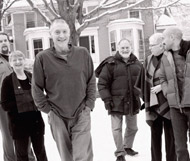It’s a rare and precious gift to meet a true bodhisattva—a human being who has dedicated his own life and spiritual liberation to something far greater than himself. Earlier this year, I had such an opportunity when I attended the seventieth birthday celebration for Bernie Glassman, the Brooklyn-born Zen roshi who is considered one of the leading figures in the “socially engaged Buddhism” movement.
Gathered together at a quaint Italian restaurant in Manhattan was an eclectic sangha of Zen students, Sufi priests, Christian nuns, and others who have been touched by Glassman’s body of work. The guest list included leaders in Glassman’s Zen Peacemakers order, such as award-winning novelist Peter Matthiessen and Prison Dharma Network founder Fleet Maull. New York’s well-known interfaith advocate Rabbi Joseph Gelberman offered a heart-warming toast, and a Christian pastor who partners with Glassman’s famous community service project, the Greyston Foundation, gave a touching speech. Glassman’s good friend Jeff Bridges (who bears a striking resemblance in real life to his role as “the Dude” in The Big Lebowski) performed a rousing set of original blues tunes. By the end of the evening, when Glassman took the stage to respond to the string of tributes, it was clear that his own depth of awakening to what he calls “the oneness of life” has been infectious. “The fact that we are all one is not a theory,” he said, transmitting a sense of awe and humility that only a truly great human being can generate. “This is what has driven me from the beginning.”
I went to the party to learn more about Glassman’s latest adventure—a Zen ministry program that he has created to bring his life’s work to a whole new generation of spiritual activists. At an age when many are retiring to southern climes, Glassman has partnered with the Harvard Divinity School’s Buddhist Studies program to form the first-ever Seminary for Socially Engaged Buddhism, a rigorous ten-month program that will prepare aspiring bodhisattvas to follow in Glassman’s footsteps and start their own spiritually inspired service projects worldwide.
Glassman, it turns out, is not your average bodhisattva. A former aeronautical engineer who became a monk after meeting his teacher, the late Taizan Maezumi Roshi, at the Zen Center of Los Angeles in the sixties, “Roshi Bernie” is as likely to be seen wearing jeans with pink suspenders as he is traditional robes and is known to create koans from his favorite Lebowski lines. Glassman is in many ways a perfect reflection of his time. Like many seekers who came of age in the East-meets-West renaissance of the sixties and seventies, he has been trying to take the insights of the spiritual tradition he was trained in and make them relevant to the sensibilities of the modern West—or as Glassman says, “to create new wineskins for spiritual practice.” But while many of his peers have followed a more individualistic spiritual path, Glassman’s own philosophy could be summed up by the words of the ninth-century Zen Master Kobo Daishi, whom he often quotes: “The way you can tell the depth of a person’s enlightenment is by the breadth of their service to others.”

Much of the inspiration for Glassman’s spiritual activism originated in the early eighties while he was leading the first of his now-famous “street retreats” in a rough neighborhood of New York City. Through these transformative “plunges,” in which Glassman and his students live among the homeless for ten days at a time—begging for food and sleeping in abandoned houses—participants are put into situations designed to shock them out of their habitual ways of relating to life. During his first plunge, Glassman noticed something that disturbed him: There were many Christian organizations offering aid but no Buddhist ones. “My sense of the oneness of life is that we should be taking care of all of the segments,” he says. The experience caused Glassman to rethink how spiritual transformation could serve the transformation of society as a whole. As he explains, “For a long period, Buddhism was new in the West, so for many of us it was all about ‘me.’ But if you’re unfolding or evolving, that sense of ‘me’ becomes bigger and can’t be constrained to a particular body.”
Glassman’s own spiritual evolution led him to found the Greyston Mandala, an innovative ecosystem of nonprofit and for-profit social enterprises in an impoverished area of Yonkers, New York, that would eventually serve as the blueprint for the Zen Ministry. Greyston started out as a gourmet bakery that trained unskilled workers to make “some of the finest cheesecake in the city” and has since evolved into a thirteen-million-dollar foundation that includes an HIV clinic, a day-care facility, and a low-income housing project. But while the foundation has raised millions of dollars and touched the lives of thousands of people, the real testament to its success for Glassman is the spiritually charged culture that imbues all of its projects. As one visitor commented to him during a tour of the facilities, “You’re not working on the individual as a practice; you’re working on society.”





